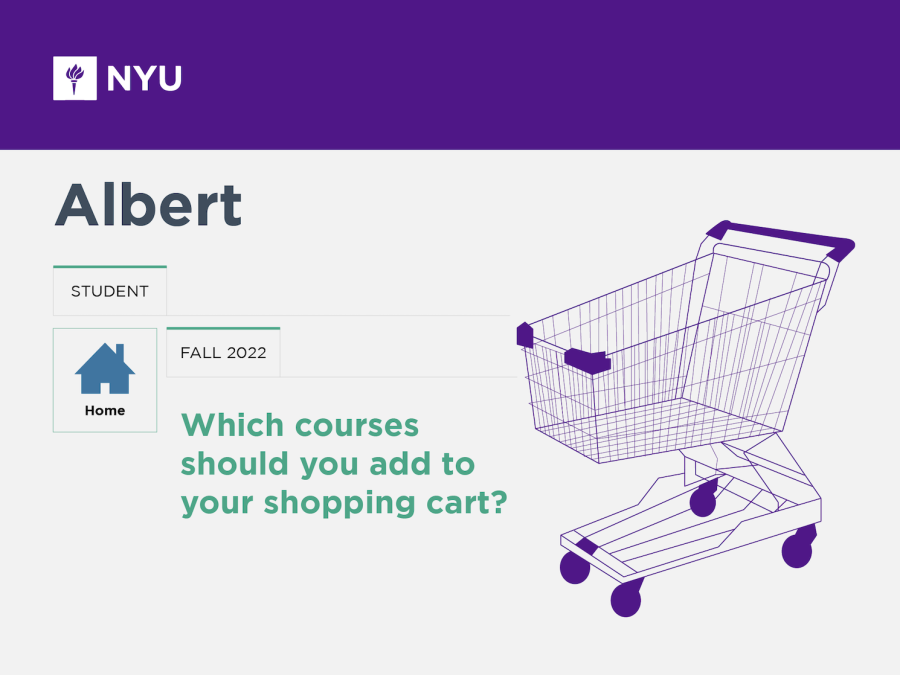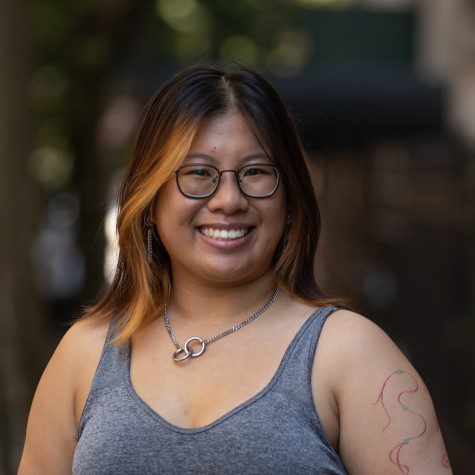How to survive course registration season
A guide to not being miserable next semester if your dream class fills up or you simply forget to register for classes.
Class registration in Albert can be stressful. Our tips can help make it a little better. (Staff Illustration by Susan Behrends Valenzuela)
April 25, 2022
Stowed away in my Google Drive is a document titled “Life Plans.” While admittedly a bit dramatic for its contents, it used to contain four combinations of classes for four different academic paths. With every passing semester, one of those potential double major combinations or timelines didn’t work out and were gradually deleted from that page.
Course registration opens this week for the fall 2022 semester. Albert — NYU’s course registration system and platform for checking prerequisites, grades, financial aid status and transcripts — will be your home base. In no way am I encouraging you to be as anxious as me — four ways to anticipate curricula is a bit much — but I do have some tips and tricks to ensure you won’t be stuck with a Core Curriculum requirement you’ll dread taking.
Remember your registration time
With every great plan, there comes the perfect time to execute it. Of course you’ll want to be as early as possible to ensure you get the classes you want, but you can’t exactly choose that. You’re assigned a registration time based on your current number of credits. Better said, the newer a student you are, the longer you’ll have to wait to register. Make sure you keep track of that time and day somewhere — an event on your calendar, a note in your planner or an alarm on your phone. Time is of the essence, and you don’t realize how much of a bloodbath getting that major requirement will be until you’re in the throes.
Know what you need to take
As much as you’ll want to blindly trust your adviser, it isn’t always the best. I’ve heard too many horror stories about friends needing to take an extra semester or wasting credits on unnecessary classes as a result of faulty advice. If you’re in Liberal Studies, start planning on what classes you’ll need to take for your anticipated major. With any other major, spread out your requirements — with passing semesters and more credits under your belt, you’ll be placed higher in choice order, giving you a better chance to take the classes you want.
A couple of weeks before registration starts, programs will release their available classes for the next semester. Take a look at what’s available and make a few schedules that align with your degree progress and interests.
See what others have to say
Think of asking people in your current or anticipated program about the classes you’re considering. Hearing about others’ experiences is a great way to vibe check a class. If I told you I didn’t really learn anything from a class I took — although I’ll be forever taken aback by the abrupt mooning I received via Zoom — but it was an easy A, depending on your priorities, it may sound like a dream come true, a nightmare or a waste of time.
However, if you don’t want to talk to people, the internet is your friend: The purpose of Rate My Professors is eponymous. When you can’t decide if you should trust those older reviews from three years ago or of a different class that professor taught, NYU has its archive of past course evaluations. When you open Albert, look under the Other Resources tab and click Course Evaluation Results. On the next page, you can sort by school, term and professor to see more ratings.
Get to know Albert
Make sure you don’t have any holds on your enrollment — you may have to talk to your adviser about classes you want to take. When all holds are lifted and you do have a list of courses you think will be perfect for next semester, add them to your Shopping Cart. After pressing the Validate / Enroll / Edit button under the Shopping Cart header, you can browse the course catalog or input the class number to add them.
As much as the enrollment process could be a one-and-done process, Albert asks you to validate your courses first. While a bit cumbersome, this process tells you that you’re allowed to enroll and if not, why — maybe you need an access code, you didn’t take a prerequisite, you need departmental consent or the class conflicts with another one you want to take. If any of these errors appear, it’s unfortunately time to talk to your adviser again.
Have a few backup classes in mind
Not to be a downer, but if you have a registration time later in the week, there’s a good chance you won’t be able to take all of the classes you’ll actually want. Child Adolescent and Mental Health Studies electives, such as the Science of Happiness, the Science and Psychology of Marijuana and Love Actually, fill up in a snap. Tolerable Texts & Ideas classes like Meaning are usually gone before underclass students get a chance.
Taking a peek at the status changes of your classes is always helpful and can guide you toward your next steps. Don’t be bummed if your class is waitlisted — especially if the waitlist is really short. After you register for the amount of credits you anticipate taking, set up the Edit Swap function. It will automatically switch you out of your backup class. But, please don’t immediately drop your class. Edit Swap only works if you link the waitlisted class with an enrolled class that will automatically get replaced if space becomes available. If you don’t link it to a class or you fill your credit hours, you will get bypassed on the waitlist. Don’t get your hopes up for closed classes, but it never hurts to email the professor and your major adviser, especially if it’s a graduation requirement.
Keep yourself in mind
As much as you’ll want to knock out all of your Core Curriculum requirements at once, keep your future plans in mind. If you plan on studying abroad, you’ll probably end up taking these classes outside of New York City. To engage more academically with cultural immersion, consider taking Cultures & Contexts: NYU London and Accra offer “The Black Atlantic” and NYU Buenos Aires offers “Latin America.” Expressive Culture classes at NYU’s global sites often involve attending operas, concerts, museums and theaters as part of the course — a great way to interact with arts in the city through class. A bonus if you’re studying away is to fulfill the dreaded language requirement while maximizing your major classes for when you come back to New York.
If you’re staying in New York City, balance your required and difficult classes with subjects you’re interested in. If you don’t, you might be stuck with a nightmare of a final semester, taking classes that could severely affect your mental health.
Regardless of what year you’re in, I hope class registration goes smoothly for you — it’s brutal out there so don’t be too upset if you don’t get even your backup classes. If there’s anything this process has taught me, it’s that a closed door, or class, might be the push you need for something bigger. Or you might need to be a bit aggressive in emailing as many contacts as you can to get into that one class.
Contact Mayee Yeh at [email protected].


























































































































































NYU Student • Apr 25, 2022 at 1:09 pm
This is so useful, thank you!